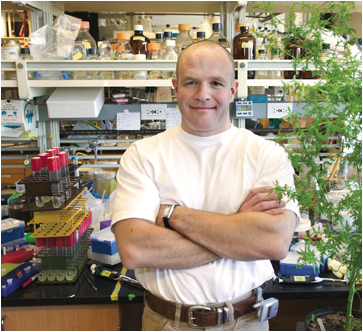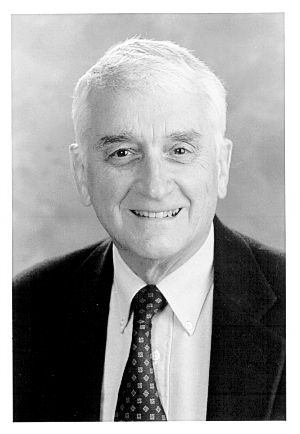by Jay Keasling
Abstract. Synthetic biology is the design and construction of new biological entities such as enzymes, genetic circuits, and cells or the redesign of existing biological systems. Synthetic biology builds on the advances in molecular, cell, and systems biology and seeks to transform biology in the same way that synthesis transformed chemistry and integrated circuit design transformed computing. The element that distinguishes synthetic biology from traditional molecular and cellular biology is the focus on the design and construction of core components (parts of enzymes, genetic circuits, metabolic pathways, etc.) that can be modeled, understood, and tuned to meet specific performance criteria, and the assembly of these smaller parts and devices into larger integrated systems that solve specific problems. Just as engineers now design integrated circuits based on the known physical properties of materials and then fabricate functioning circuits and entire processors (with relatively high reliability), synthetic biologists will soon design and build engineered biological systems.
We have used synthetic biology to create inexpensive, effective, anti-malarial drugs. Currently, malaria infects 300-500 million people and causes 1-2 million deaths each year, primarily children in Africa and Asia. One of the principal obstacles to addressing this global health threat is a lack of effective, affordable drugs. The chloroquine-based drugs that were used widely in the past have lost effectiveness because the Plasmodium parasite which causes malaria has become resistant to them. The faster-acting, more effective artemisinin-based drugs - as currently produced from plant sources - are too expensive for large-scale use in the countries where they are needed most. The development of this technology will eventually reduce the cost of artemisinin-based combination therapies significantly below their current price. To reduce the cost of these drugs and make them more widely available, we have used synthetic biology to engineer microorganisms to produce artemisinin from renewable resources.
Having successfully completed the artemisinin work, we are now engineering the metabolism of the same microorganisms (Escherichia coli and Saccharomyces cerevisiae) for production of advanced biofuels. Unlike ethanol, these biofuels will have the full fuel value of petroleum-based biofuels, will be transportable using existing infrastructure, and can be used in existing automobiles and airplanes. These biofuels will be produced from natural biosynthetic pathways that exist in plants and a variety of microorganisms. Large-scale production of these fuels will reduce our dependence on petroleum and reduce the amount of carbon dioxide released into the atmosphere, while allowing us to take advantage of our current transportation infrastructure.
 Biography.
Jay Keasling is a Professor of Bioengineering and Chemical
Engineering at the University of California, Berkeley and the
Acting Deputy Director and CEO of the Joint BioEnergy Institute
at Lawrence Berkeley National Lab. His research is organized
around three primary themes: synthetic biology, systems biology
and environmental biotechnology. He has been associated with
institutions throughout the country such as the Massachusetts
Institute of Technology, Michigan State University,
Johns Hopkins and Stanford University. He has published over
150 articles. For his breakthroughs in the field of synthetic
biology, including treatments for malaria, AIDS, and cancer
as well as discoveries of new fuel resources, Discover Magazine
awarded Professor Keasling with its first-ever Scientist of
the Year award in 2006.
On the lighter side, Stephen Colbert accused him of
being a mad scientist in his
Colbert Report appearance
last March.
Biography.
Jay Keasling is a Professor of Bioengineering and Chemical
Engineering at the University of California, Berkeley and the
Acting Deputy Director and CEO of the Joint BioEnergy Institute
at Lawrence Berkeley National Lab. His research is organized
around three primary themes: synthetic biology, systems biology
and environmental biotechnology. He has been associated with
institutions throughout the country such as the Massachusetts
Institute of Technology, Michigan State University,
Johns Hopkins and Stanford University. He has published over
150 articles. For his breakthroughs in the field of synthetic
biology, including treatments for malaria, AIDS, and cancer
as well as discoveries of new fuel resources, Discover Magazine
awarded Professor Keasling with its first-ever Scientist of
the Year award in 2006.
On the lighter side, Stephen Colbert accused him of
being a mad scientist in his
Colbert Report appearance
last March.
Dr. Keasling's lecture is jointly sponsored by the International Center for Advanced Renewable Energy and Sustainability (I-CARES).

 Jerome R. Cox, Jr. joined Washington University in 1955 and has played
an important role in its on-going development over the last 50 years.
In the 1960s, he founded the Biomedical Computing Laboratory,
which pioneered the application of computers to applications in medicine.
In the 1970s he became the founding chairman of the Department of
Computer Science, and guided the department's development and
growth over more than 15 years. Jerry's early work on radiation treatment planning paved the way for systems in worldwide operation today. He led a research
team that developed early computational methods for reconstructing
images from CT and PET scanners, aiding in the diagnosis of
cancers and cardiovascular disease. His leadership in the early
development of picture archiving and communications systems contributed to
the development of electronic radiology and high speed communications
technologies that have had an important impact on both the practice
of medicine and the operation of the Internet.
Jerome R. Cox, Jr. joined Washington University in 1955 and has played
an important role in its on-going development over the last 50 years.
In the 1960s, he founded the Biomedical Computing Laboratory,
which pioneered the application of computers to applications in medicine.
In the 1970s he became the founding chairman of the Department of
Computer Science, and guided the department's development and
growth over more than 15 years. Jerry's early work on radiation treatment planning paved the way for systems in worldwide operation today. He led a research
team that developed early computational methods for reconstructing
images from CT and PET scanners, aiding in the diagnosis of
cancers and cardiovascular disease. His leadership in the early
development of picture archiving and communications systems contributed to
the development of electronic radiology and high speed communications
technologies that have had an important impact on both the practice
of medicine and the operation of the Internet.